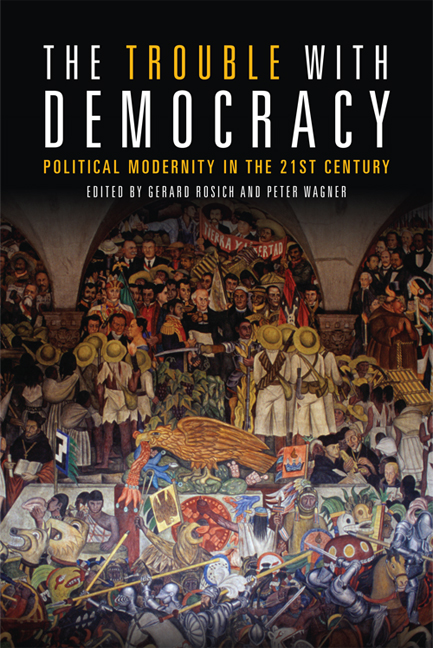Book contents
- Frontmatter
- Contents
- Acknowledgements
- List of Contributors
- 1 Introduction: Re-Interpreting Democracy for Our Time
- 2 Autonomy in and between Polities: Democracy and the Need for Collective Political Selves
- 3 Rethinking ‘Modern’ Democracy: Political Modernity and Constituent Power
- 4 Democratic Surplus and Democracy-in-Failing: On Ancient and Modern Self-Cancellation of Democracy
- 5 Setbacks of Women's Emancipation (Condition, Consequence, Measure and Ruse)
- 6 Political Modernity, Democracy and State–Society Relations in Latin America: A New Socio-Historical Problématique?
- 7 Communitarian Cosmopolitanism: Argentina's Recuperated Factories, Neoliberal Globalisation and Democratic Citizenship. An Arendtian Perspective
- 8 Middle-Classing in Roodepoort: Unexpected Sites of Post-Apartheid ‘Community’
- 9 Democracy and Capitalism in Europe, Brazil and South Africa
- 10 From Realism to Activism: A Critique of Resignation in Political Theory
- 11 The World as We Find It: A Suggestion for a Democratic Theory for Our Times
- 12 Epilogue: Democracy as Capacity for Self-Transformation
- Index
10 - From Realism to Activism: A Critique of Resignation in Political Theory
Published online by Cambridge University Press: 05 September 2016
- Frontmatter
- Contents
- Acknowledgements
- List of Contributors
- 1 Introduction: Re-Interpreting Democracy for Our Time
- 2 Autonomy in and between Polities: Democracy and the Need for Collective Political Selves
- 3 Rethinking ‘Modern’ Democracy: Political Modernity and Constituent Power
- 4 Democratic Surplus and Democracy-in-Failing: On Ancient and Modern Self-Cancellation of Democracy
- 5 Setbacks of Women's Emancipation (Condition, Consequence, Measure and Ruse)
- 6 Political Modernity, Democracy and State–Society Relations in Latin America: A New Socio-Historical Problématique?
- 7 Communitarian Cosmopolitanism: Argentina's Recuperated Factories, Neoliberal Globalisation and Democratic Citizenship. An Arendtian Perspective
- 8 Middle-Classing in Roodepoort: Unexpected Sites of Post-Apartheid ‘Community’
- 9 Democracy and Capitalism in Europe, Brazil and South Africa
- 10 From Realism to Activism: A Critique of Resignation in Political Theory
- 11 The World as We Find It: A Suggestion for a Democratic Theory for Our Times
- 12 Epilogue: Democracy as Capacity for Self-Transformation
- Index
Summary
This chapter presents a critique of realism in political theory. It focuses on two issues central to the realist agenda: the problem of politics as characterised by radical disagreement and the role of motives in conceptualising political action. It introduces an activist approach to political theory which is close to political moralists’ concern for justice while also acknowledging the force of some realist critiques. On this approach, norms of justice develop in response to the concerns and commitments of real-life political agents, but also appeal to historically developed moral criteria in critically assessing different practices of political contestation. They are thus sensitive to the circumstances of politics and able to motivate political agents, but also help us avoid the politics of resignation to which some strands of realism seem to give rise.
The ‘realism’ controversy in political theory
Philosophers, a famous slogan reads, have only interpreted the world in various ways; the point is now to change it. One way to understand the realism controversy in political theory is as a dispute about the meaning and plausibility of this slogan. On one side of the dispute stand those, call them political moralists, who read the argument in a disjunctive form, and then proceed to deny its validity. Political change and moral argument, they contend, are not a matter of either-or: they appear closely intertwined with each other. The choice is never between either interpreting the world or changing it, but rather trying to change it in a way that reflects the most appropriate (collective) interpretation of fundamental moral norms. On the other side of the dispute stand those, call them political realists, who read the second part of the statement as taking priority over the first. Political action and change, they claim, belong to a sphere that is irreducible to the demands of morality and the particular interpretations that follow from it. The domain of the political, so their argument goes, is characterised by profound disagreement and radical conflict amongst a plurality of perspectives. Endorsing moral criteria (however we arrive at them) to orient the reform of political institutions would at best be inconclusive, at worst dangerous.
- Type
- Chapter
- Information
- The Trouble with DemocracyPolitical Modernity in the 21st Century, pp. 233 - 248Publisher: Edinburgh University PressPrint publication year: 2016



